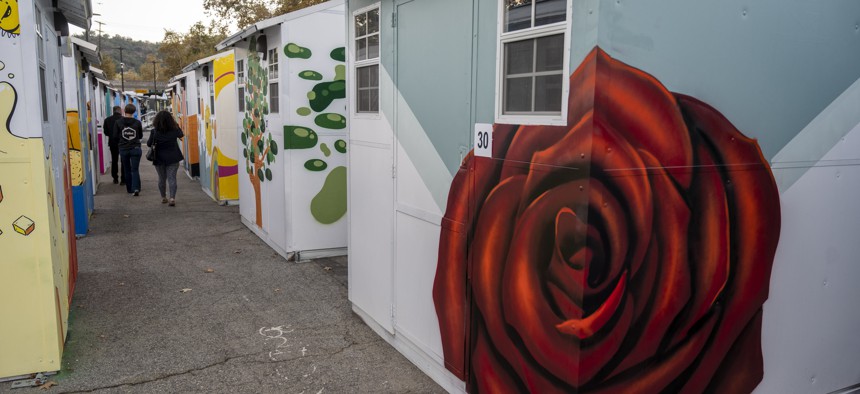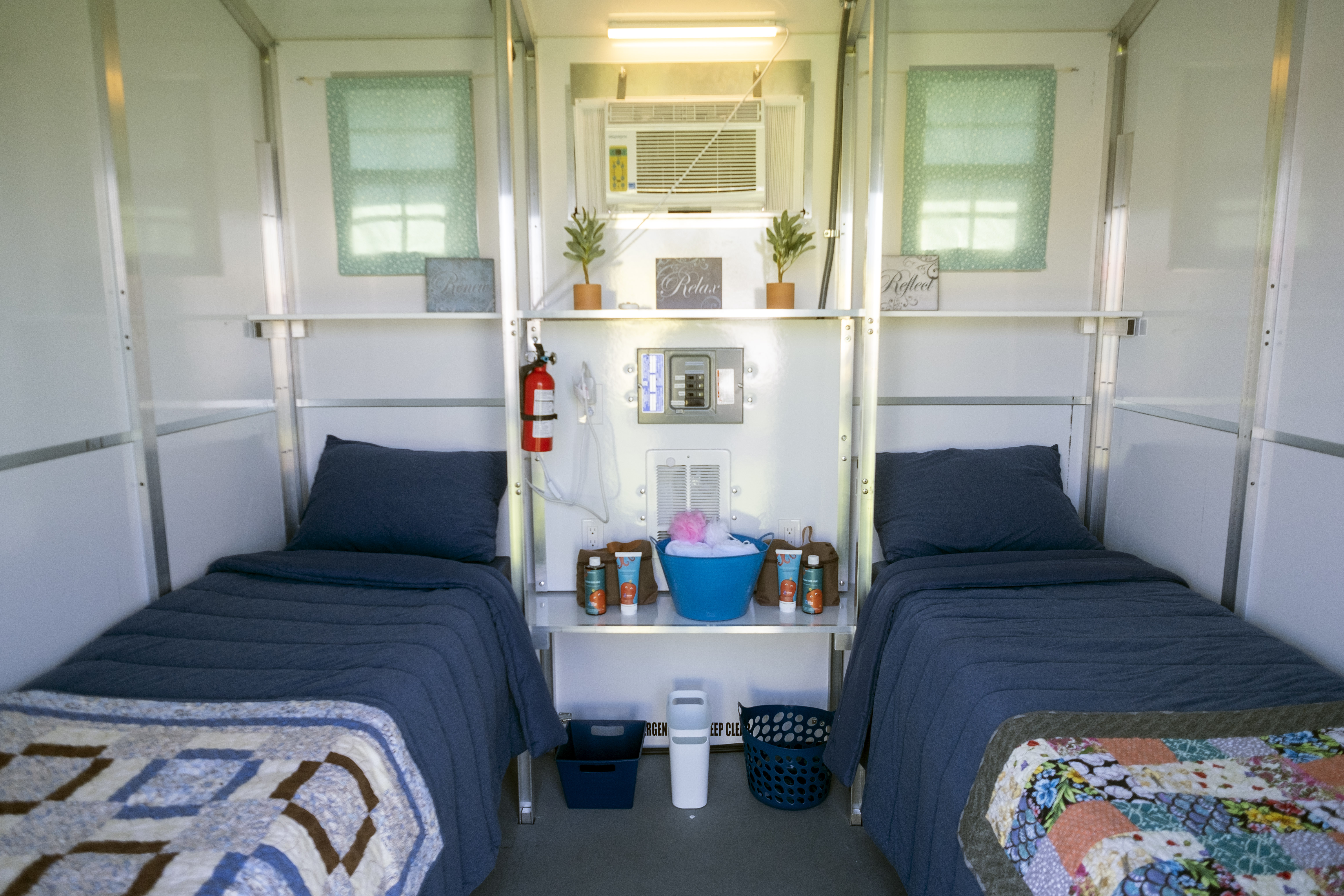The Rise of Tiny House Villages in the Fight Against Homelessness

People tour the Arroyo Seco Tiny Home Village in Highland Park in Los Angeles. The site, with 117 housing units, opened last fall. Photo by Hans Gutknecht/MediaNews Group/Los Angeles Daily News via Getty Images

Connecting state and local government leaders
More cities are turning to the small-sized structures as an alternative to group shelters. But critics have likened them to "sheds" that fall well short of permanent affordable housing.
Madison, Wisconsin's first tiny house village consists of 30 small shelters for people experiencing homelessness, with onsite security and support services for mental health and addiction issues.
The facility, funded partly with federal money, opened last fall and marks a big change from the city’s pre-pandemic approach to housing, which relied on cramped shelters in church basements downtown, said Jim O’Keefe, director of the city’s community development division. All 30 tiny houses were quickly occupied, O’Keefe said, and the city has started keeping a waitlist for future residents.
It’s not a permanent housing solution, but depending on how it evolves—and whether the city can maintain funding—it could become a lasting part of the city’s approach to addressing homelessness, O’Keefe said. He noted that “there’s a cohort of folks who cannot or will not use” shared shelter space and he said the city has struggled to figure out how to provide services to these people. The tiny house village is so far proving to be part of the solution.
Madison isn’t the only city exploring tiny houses as a tool to address homelessness. For instance, Los Angeles last October opened a tiny home village with 115 structures and 224 beds that the city said was the largest facility of its kind in the U.S. It's one of at least a half-dozen tiny home projects in the city.
Since the pandemic began, cities and homeless service providers have begun putting more emphasis on “non-congregate” shelter as an emergency housing service. The Federal Emergency Management Agency endorsed the approach, which involves providing individual lodging for people, rather than housing them in group settings.
Many cities, including Madison, have turned to existing rooms in hotels and motels to provide non-congregate shelter for people experiencing homelessness. Communities of tiny houses are another option, one that sits somewhat awkwardly between traditional congregate shelters and affordable permanent housing.
A Different Type of Shelter
In Madison, officials spent the early days of the pandemic opening new shelter space in city-owned properties, as an alternative to the crowded basement shelters that already existed, O’Keefe said.
But that approach didn’t serve everyone in a city that, like many others, struggles with a severe affordable housing shortage. With nearly 270,000 residents, Madison is home to the flagship campus of the University of Wisconsin, which has around 40,000 students.
Last year, a small encampment formed in the city’s Reindahl Park, first with half a dozen people in tents and growing to a peak of around 80 residents, O’Keefe said.
It “was not a safe or healthy arrangement,” he added.
In the fall, the city moved to clear the encampment. It opened the Dairy Drive tiny house village around the same time, allowing people to voluntarily sign up to live there. Initially, the city worried that people wouldn’t be interested in moving into the facility, but buy-in has exceeded expectations, O’Keefe said, adding that, so far, six residents have moved from tiny houses into permanent housing.
Madison has directed some $8.65 million of the $47 million it received through the American Rescue Plan Act to homelessness initiatives, including $2 million for the Dairy Drive village. The project wouldn’t have been possible without federal funds, according to O’Keefe. The city is also working to open a new permanent men’s shelter.
“We want to do everything we can to make our congregate shelter a place where people are willing to go to, and to knock down as many barriers as we can, and then I think we’ll need to assess whether it’s going to be necessary to maintain some kind of alternative,” he said.
“Outdoor camping is just not a viable solution or a safe alternative year-round, and I think we recognize that we may need to do more than just the congregate shelter,” he added.
The Seattle Experience
Seattle opened three new tiny house villages in 2021, bringing the total number of city-supported tiny houses to more than 400, according to a city spokesperson. The facilities play an important role in an overall homelessness strategy, explained Marc Dones, CEO of the King County Regional Homelessness Authority, which operates Seattle’s shelters, including its tiny house villages.
But it’s a concern when communities look to tiny houses as a “good enough” solution, Dones said, emphasizing that tiny houses operate as emergency shelters, not as long-term housing. Dones and others make the case that traditional congregate shelters were always inhumane and a public health risk that needed to be rethought.
But cities and service providers can’t stop with tiny houses, Dones said. They should invest as well in hotel and motel conversions, accessory dwelling units, and other types of single-room occupancy housing. The more that housing for people experiencing homelessness looks like typical housing for everyone else, the better, Dones said.
“At the core of everything has to be dignity and choice,” Dones added.
Tiny homes themselves are sometimes criticized as a substandard form of housing.
The Washington State Lived Experience Coalition, a group of advocates who have experienced homelessness, likens tiny homes to “sheds” and has said that they “do not meet federal human habitability standards.”
More importantly, the group said, tiny homes “do not end anyone’s experience of homelessness.”

But to supporters, the projects provide an important option to get people housed.
“Solving homelessness demands creative and lasting solutions that meet the immediate and critical need for housing today, while giving our unhoused neighbors a path to a permanent place to call home tomorrow,” Los Angeles Mayor Eric Garcetti said when the tiny home village opened there last fall.
Protests in Philadelphia
During the Black Lives Matter uprisings in the summer of 2020, a group of unhoused people and advocates formed a series of protest encampments in Philadelphia. The groups had a list of demands, including for the Philadelphia Housing Authority to turn over vacant properties to a community land trust run by the organizers. The group also pushed for tiny house villages for unhoused people.
(One of the lead organizers of the protests, Jennifer Bennetch, recently died at the age of 36 after contracting Covid-19. A GoFundMe campaign was organized to support her children.)
The protesters’ call for tiny house facilities dovetailed with the interests some city officials had, but had yet to act on, said Liz Hersh, director of Philadelphia’s Office of Homeless Services.
Hersh said she had considered herself a tiny house skeptic before visiting Seattle in 2018. There, she said she spoke with people who lived in tiny house villages who found them to be much more welcoming than congregate shelters.
Philadelphia is now moving ahead with two tiny house villages that are intended to serve different purposes. One is a non-congregate emergency shelter, meant as a temporary place to help people connect with support services and permanent housing. The other is a pilot for a more permanent community. The two villages “have different functions within a continuum,” Hersh noted.
Hersh said she hopes that the city learns something from both programs about what services are most beneficial to people experiencing homelessness, knowing that the only true solution is permanent housing for everyone. But, for some, tiny houses are an improvement over congregate shelters, she said, and that’s enough reason to feel upbeat about the planned facilities in Philadelphia.
“Sometimes you make the best choice you can possibly make with the information and resources you have because it’s better than the other choice, even though it may still be suboptimal and you don’t know where it’s going to lead,” Hersh said.
“I just believe you have to take risks, and you can’t sit around and criticize everything,” she added.“To me the moral imperative of ending homelessness overrides that.”

NEXT STORY: Key GOP Lawmaker Skeptical of Buttigieg’s Reassurances on Transportation Spending


